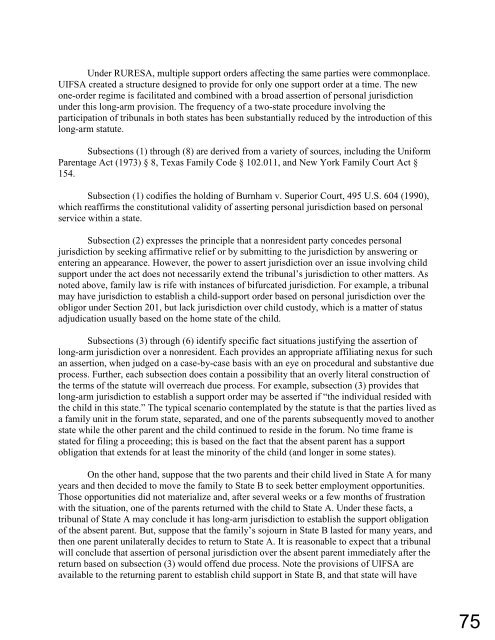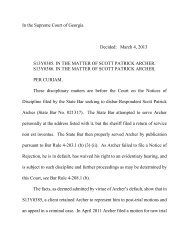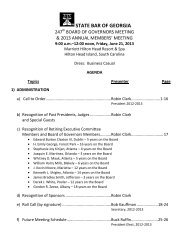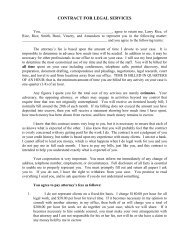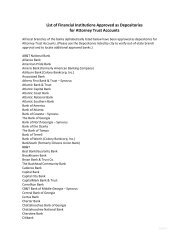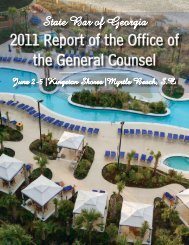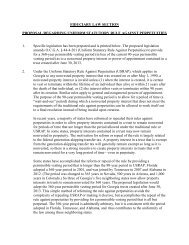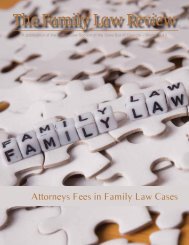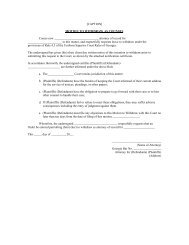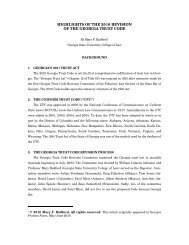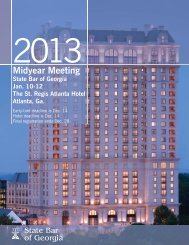2008 Amendments to the Uniform Interstate Family Support Act ...
2008 Amendments to the Uniform Interstate Family Support Act ...
2008 Amendments to the Uniform Interstate Family Support Act ...
Create successful ePaper yourself
Turn your PDF publications into a flip-book with our unique Google optimized e-Paper software.
Under RURESA, multiple support orders affecting <strong>the</strong> same parties were commonplace.<br />
UIFSA created a structure designed <strong>to</strong> provide for only one support order at a time. The new<br />
one-order regime is facilitated and combined with a broad assertion of personal jurisdiction<br />
under this long-arm provision. The frequency of a two-state procedure involving <strong>the</strong><br />
participation of tribunals in both states has been substantially reduced by <strong>the</strong> introduction of this<br />
long-arm statute.<br />
Subsections (1) through (8) are derived from a variety of sources, including <strong>the</strong> <strong>Uniform</strong><br />
Parentage <strong>Act</strong> (1973) § 8, Texas <strong>Family</strong> Code § 102.011, and New York <strong>Family</strong> Court <strong>Act</strong> §<br />
154.<br />
Subsection (1) codifies <strong>the</strong> holding of Burnham v. Superior Court, 495 U.S. 604 (1990),<br />
which reaffirms <strong>the</strong> constitutional validity of asserting personal jurisdiction based on personal<br />
service within a state.<br />
Subsection (2) expresses <strong>the</strong> principle that a nonresident party concedes personal<br />
jurisdiction by seeking affirmative relief or by submitting <strong>to</strong> <strong>the</strong> jurisdiction by answering or<br />
entering an appearance. However, <strong>the</strong> power <strong>to</strong> assert jurisdiction over an issue involving child<br />
support under <strong>the</strong> act does not necessarily extend <strong>the</strong> tribunal’s jurisdiction <strong>to</strong> o<strong>the</strong>r matters. As<br />
noted above, family law is rife with instances of bifurcated jurisdiction. For example, a tribunal<br />
may have jurisdiction <strong>to</strong> establish a child-support order based on personal jurisdiction over <strong>the</strong><br />
obligor under Section 201, but lack jurisdiction over child cus<strong>to</strong>dy, which is a matter of status<br />
adjudication usually based on <strong>the</strong> home state of <strong>the</strong> child.<br />
Subsections (3) through (6) identify specific fact situations justifying <strong>the</strong> assertion of<br />
long-arm jurisdiction over a nonresident. Each provides an appropriate affiliating nexus for such<br />
an assertion, when judged on a case-by-case basis with an eye on procedural and substantive due<br />
process. Fur<strong>the</strong>r, each subsection does contain a possibility that an overly literal construction of<br />
<strong>the</strong> terms of <strong>the</strong> statute will overreach due process. For example, subsection (3) provides that<br />
long-arm jurisdiction <strong>to</strong> establish a support order may be asserted if “<strong>the</strong> individual resided with<br />
<strong>the</strong> child in this state.” The typical scenario contemplated by <strong>the</strong> statute is that <strong>the</strong> parties lived as<br />
a family unit in <strong>the</strong> forum state, separated, and one of <strong>the</strong> parents subsequently moved <strong>to</strong> ano<strong>the</strong>r<br />
state while <strong>the</strong> o<strong>the</strong>r parent and <strong>the</strong> child continued <strong>to</strong> reside in <strong>the</strong> forum. No time frame is<br />
stated for filing a proceeding; this is based on <strong>the</strong> fact that <strong>the</strong> absent parent has a support<br />
obligation that extends for at least <strong>the</strong> minority of <strong>the</strong> child (and longer in some states).<br />
On <strong>the</strong> o<strong>the</strong>r hand, suppose that <strong>the</strong> two parents and <strong>the</strong>ir child lived in State A for many<br />
years and <strong>the</strong>n decided <strong>to</strong> move <strong>the</strong> family <strong>to</strong> State B <strong>to</strong> seek better employment opportunities.<br />
Those opportunities did not materialize and, after several weeks or a few months of frustration<br />
with <strong>the</strong> situation, one of <strong>the</strong> parents returned with <strong>the</strong> child <strong>to</strong> State A. Under <strong>the</strong>se facts, a<br />
tribunal of State A may conclude it has long-arm jurisdiction <strong>to</strong> establish <strong>the</strong> support obligation<br />
of <strong>the</strong> absent parent. But, suppose that <strong>the</strong> family’s sojourn in State B lasted for many years, and<br />
<strong>the</strong>n one parent unilaterally decides <strong>to</strong> return <strong>to</strong> State A. It is reasonable <strong>to</strong> expect that a tribunal<br />
will conclude that assertion of personal jurisdiction over <strong>the</strong> absent parent immediately after <strong>the</strong><br />
return based on subsection (3) would offend due process. Note <strong>the</strong> provisions of UIFSA are<br />
available <strong>to</strong> <strong>the</strong> returning parent <strong>to</strong> establish child support in State B, and that state will have<br />
75


